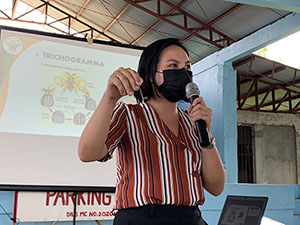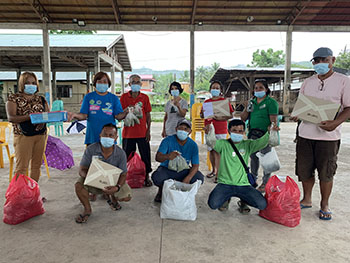 |
 |
Farmers’ struggle against pests and diseases is real. The devastating effects of the outbreaks of insect pests and diseases add to a farmer’s distress and probable losses.
According to the Food and Agriculture Organization of the United Nations, pests and diseases have historically affected food production either directly or indirectly through losses in food crop yield. These losses are worsening by the changing climate, and its increasing volatility, threatening food security and rural livelihoods across the globe.
With this the Department of Agriculture-Caraga Regional Agriculture and Fishery Information Section (RAFIS) together with the Crop Pest Management – Regional Technical Working Group conducted the Information Caravan on the Prevention and Control of Emerging Pest and Diseases on Rice and Corn in the Municipalities of Las Nieves, Jabonga, Kitcharao, Buenavista, and Nasipit, Agusan del Norte on May 11, 18, & 20.
The campaign aimed to capacitate and strengthen farmer’s decision-making ability and pests and disease management practices through the use of Integrated Pest Management (IPM). DA also emphasized the use of Biological Control Agents (BCA or Biocon) in optimizing the production of the region’s major commodities.
According to Science Research Specialist II Maricel Jabao-Didal of the Regional Crop Pest Management Center (RCPMC), BCA is a friendly organism that is used to manage different pests. It is considered the best alternative to pesticides, efficient and safe for humans and also the environment.
“Farmers should know that there are effective environment-friendly alternatives to pest management such as the use of Biocon. RCPMC provides these services for free from technical assistance to the distribution of biological control agents such as parasitoids like Trichogramma sp., pathogen like Metarhizium anisopliae, Trichoderma sp, Beauveria bassiana, Nuclear Polyedrosis, and predators such as Chilocorus nigrita, earwig, green lacewing, and assassin bug which are beneficial in managing pest,” said Didal.
Most farmers rely heavily on inorganic fertilizers and pesticides without knowing the environmental pollution caused by the excessive and indiscriminate use of agrochemicals. This leads to the decline of the area’s biodiversity such as the natural enemies and microorganisms in the field.
“The RCPMC is into mass production of these useful Biocon agents to be a reliable partner of the farmers for crop pest management,” Didal added.
This year, RCPMC targets to distribute a total of 6,000 packs of Metarhizium anisopliae, 6,000 packs of Trichoderma sp., 10,000 trichocards of Trichogramma, and 50,000 adults of earwig.
Thus, the regionwide information caravan reinforces the knowledge of the farmers about pest management.
For Narcie B. Rosales, a rice farmer from Barangay Poblacion, Jabonga, Agusan del Norte, knowing how to deal with pests and diseases in her area is a big help.
“The identification of beneficial and harmful insects on rice is very important because this will help me to decide which appropriate prevention and management control measures in the field I should use. I have now a better option knowing the benefits of BCA,” said Rosales.
Aside from imparting awareness to farmers, DA believes that interpersonal communication, even amid the pandemic, is vital in changing the mindset of the farmers on chemical use and rather use the biological control agents in managing pests and diseases. (Rhea C. Abao, DA-Caraga RAFIS)
